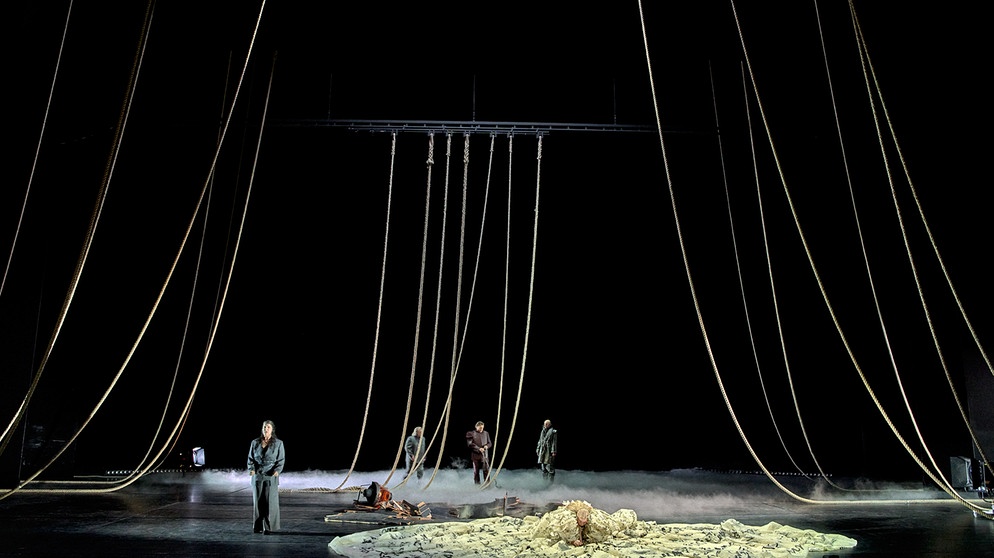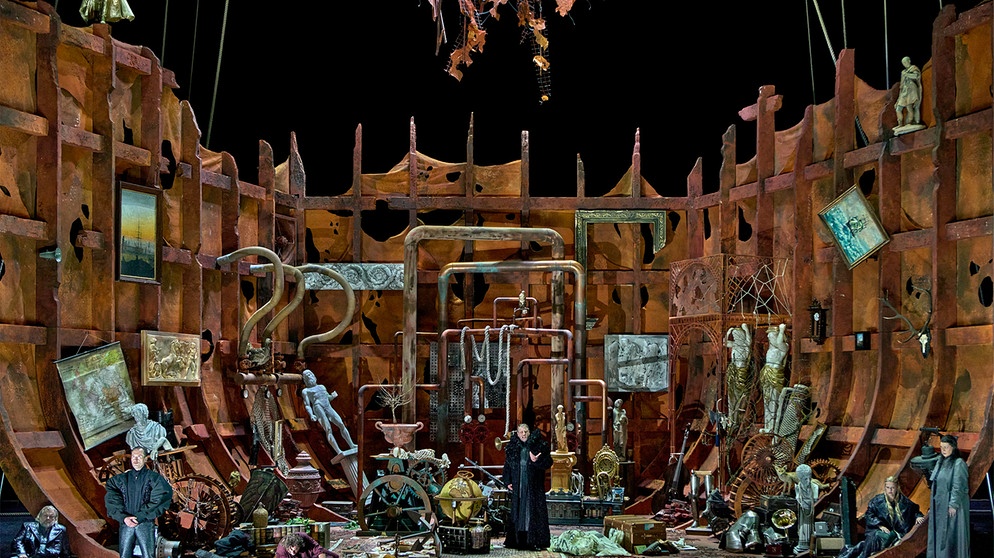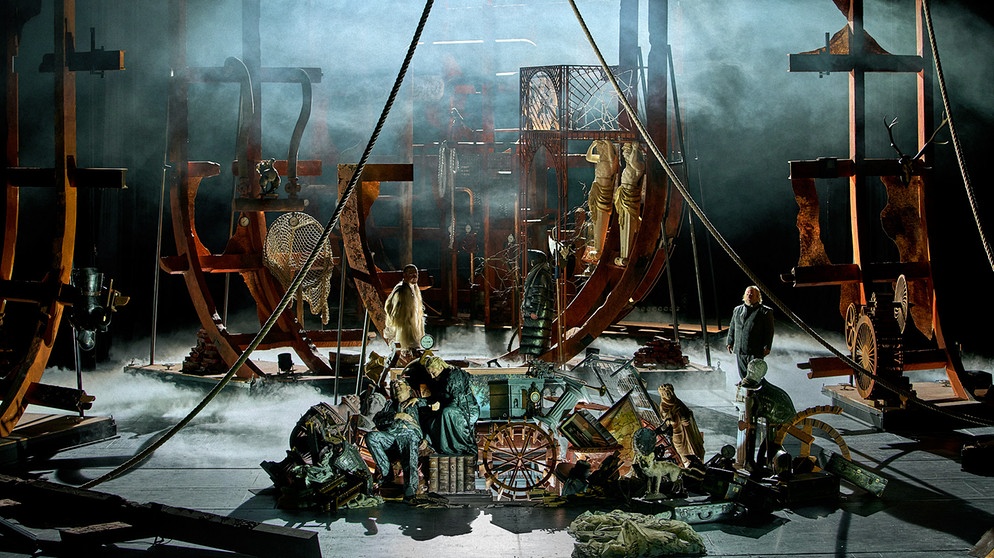Live stream from Bayreuth Festival, July 25, 2024.
This new production is directed by the Icelandic playwright Thorleifur Örn Arnarsson, and the orchestra is conducted by the famous Russian maestro Semyon Bychkov, a renowned interpreter of this opera.
This is an opera in which the inside matters more than the outside: here what counts are the feelings of Tristan and Isolde, as if the music and their monologues were the window to their internal conflicts, no matter the space, only this love story and its consequences, as the chorus is scarce and brief, and few characters are seen on stage. For this reason, it lends itself reasons not only to being performed many times in concert, but also to be staged with simpler and simpler productions, given the intimate nature of the work. Already in Cosima Wagner's times there was an attempt to reduce the props, in order to focus on the action. And Arnarsson's staging seems to follow this idea, as the staging looks minimalistic in at least half of the performance, and totally dark, gloomy, as if the events took place at night, from the deepest levels of the soul, telling the story as a repressed and condemned passion, destined to fail. There is no beauty, only discretion and emotions, with a feeling of not doing the right thing.
The first act takes place on a darkened, empty stage, there are only some strings, and Isolde appears in an enormous white dress, a nod to Jean-Pierre Ponnelle's staging in 1983, completely full of words from the libretto or other works by Wagner. Isolde can slip out of this dress, leaving her crinoline exposed, and in the background, in the first scene, are Kurwenal, Brangäne and Tristan, as if they were plotting Isolde's destiny (a nod to Götterdämmerung?). Tristan's entrance into his confrontation with Isolde makes the stage get illuminated. Tristan does not drink the elixir of love, but before he can do so Isolde throws it away. In fact, that elixir is none other than their falling in love, the kiss they give each other and with which they begin to love each other passionately.
The second act is the most impressive, although the first scene still takes place in darkness. It is from Tristan's entrance, and the beginning of the great love scene, when the scene is illuminated, to show the enormous bow of a dilapidated ship, inside which are a lot of old odds and ends, such as watches, suitcases , documents, a huge globe, but also some items reminiscent of elements from Wagner's operas: a sword with which Tristan wounds his hand, a nod to the Ring, a statuette of a wolf, a nod to Walküre, another statuette, this time of a medieval woman with a veil, a possible nod to Tannhäuser, among others. Tristan is not hurt by Melot, but drinks an elixir that poisons him.
The Third Act is now that same ship, but torn apart, with all the old junk piled up in a corner, now Tristan is wearing a gray, worn jumpsuit with letters written on it. The spaciousness left by the remains of that ship brings minimalism back to the scene. Tristan dies, after his long and agonizing scene, in which an orange light attenuates the darkness. Isolde appears, and after her the other characters, but Melot does not die, and it is not known, although it is presumed, if Kurwenal does. At the end, Isolde sings her famous Liebestod, snuggling in her long dress, after which the curtain slowly falls on a stage bathed in a red light.
Semyon Bychkov returns to conduct the Bayreuth Festival Orchestra after conducting Parsifal a few years ago. Just as he did in Madrid last year, Bychkov gives slow, majestic, lyrical rendition, recreating the rich range of sounds and the possibilities available to work with the orchestra, to create a magical, and at the same time profound and melancholic world, like this impossible love. The prelude was played in a majesic, beautiful rendition, while the orchestral introduction to the third act with the English horn sounds more introspective. The orchestra has no comment other than its excellence, because of its strings, its percussions and its powerful brass. The male choir is excellent in its brief interventions in the first act.
Andreas Schager, like in the same Tristan who sang with Bychkov in Madrid, confirms himself as the first nowadays option to sing Tristan. His heroic tone, with youthful sounds, his ability to ressist the throat-killer tessitura from the powerful third act, which he sang in a captivating way despite some notes that he already had to shorten. At an acting level he creates a solemn hero in the first, a sensitive one in the second act and in the third he reaches the climax by recreating the agony and hallucinations of the character.
Camilla Nylund, on the other hand, is not an Isolde to pair his level. The Finnish soprano has a sweet voice, exquisite tone and sensitive singing, but this is not enough for Isolde. Although the voice has moments where it improves, such as in the second half of the first act, the brief aria "Als für in fremdes land" in the second act, beautifully sung, when the voice requires more pitch, which cannot last long, is where the volume fails and notes are a in a little trouble. In this way, in the Liebestod she could not impose herself on the orchestra. And it's a pity, because in roles like Eva or Elisabeth she is remarkable.
Christa Mayer is a well sung Brangäne, with a firmer voice than Nylund's, excellent in her famous warning song "Einsam wachend in der nacht" in the second act.
Olafur Sigurdarson is a light Kurwenal, although in the third act he does well, due to the intimate nature of the scenes with Tristan, but he lacks volume and vocal presence.
Günther Groissböck suffers from the same lightness, he is an exquisitely sung Marke and has a beautiful voice that also has excellent diction, proof of his knowledge of the work. However, he lacks more volume and bass in his long monologue in the second act.
Birger Radde's Melot is simply outstanding, with a dark, imposing, well-projected voice, so much so that he could have made an excellent Kurwenal. The rest of the supporting roles, were also at a good level, a trademark of the house: the lyrical voice of Matthew Newlin as the sailor and Daniel Jenz as the shepherd stand out.
Once again, the cast was received with warm applause, especially Schager, Groissböck and Nylund, although the most applauded, for deserved and obvious reasons, was Bychkov. Boos, like every year, for the stage team, although it is already known in Bayreuth that every new production is booed the first year, and its last one is strongly ovationed. After this premiere performance, the 2024 Bayreuth Festival is inaugurated: a festival in which there are more women than men on the podium, and which has opened with a beautiful Tristan, which we trust will improve, especially the cast, in the seasons to come.
My reviews are not professional and express only my opinions. As a non English native speaker I apologise for any mistake.
Most of the photographs are from the internet and belong to its authors. My use of them is only cultural. If someone is uncomfortable with their use, just notify it to me.
Any reproduction of my text requires my permission.





I don't want to be negative, but one aspect of the production seemed really misguided. In the second act, during the "love duet", Tristan and Isolde are wandering around the stage for a long time, hardly looking at one another. The first time they are close is when Isolde approaches Tristan.... and slaps him! Then walks off again.
ResponderEliminarWhy?
I agree that the singing was generally fine. Nylund's voice didn't measure up to Schager, who was LOUD. She did have vocal difficultgies, or at least, limitations., but she was generally satisfactory.
Bychkov's conducting was very good. One moment that I especially liked was at the very end, when he held the final chord for a long time.